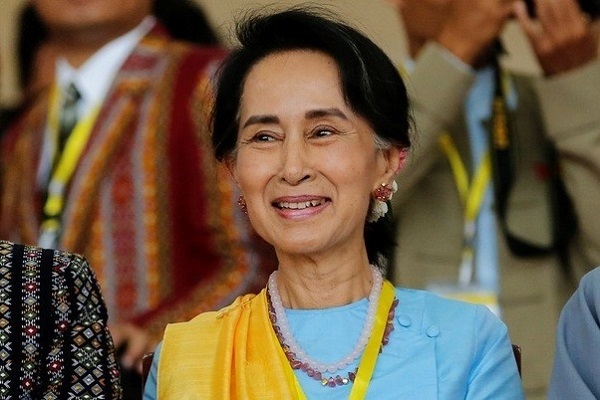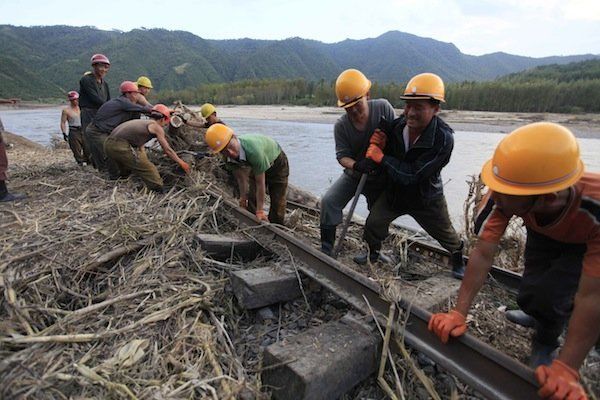Suu Kyi freed
Myanmar’s democracy leader Aung San Suu Kyi walked free yesterday from the lakeside home that has been her prison for most of the past two decades, to the delight of huge crowds of waiting supporters.
Waving and smiling, the Nobel Peace Prize winner appeared briefly to loud cheers and clapping from the thousands of people gathered for a glimpse of the 65-year-old, known in Myanmar simply as “The Lady”.
“We must work together in unison,” she told the sea of jubilant supporters, suggesting she has no intention of giving up her long fight for democracy in what is one of the world’s oldest dictatorships.
She asked the crowd to come to her party’s headquarters today to hear her speak after she struggled to make herself heard over the roar of cheers, then went back inside her home as the crowds lingered outside.
Although she has been sidelined and silenced by the junta — occasionally released briefly only to be put back in confinement — for many in the impoverished nation she still embodies hope of a better future.
“I think of her as my mother and also my sister and grandmother because she’s the daughter of our independence leader General Aung San,” said 45-year-old Naing Win. “She has her father’s blood.”
Despite the risks of opposing the military regime in a country with more than 2,200 political prisoners, many supporters wore T-shirts bearing her image and the words: “We stand with Aung San Suu Kyi.”
Undercover police were photographing and filming the crowds.
Myanmar’s most famous dissident has been under house arrest since 2003 — just one of several stretches of detention at the hands of the ruling generals.
Her sentence was extended last year over a bizarre incident in which an American swam uninvited to her lakeside home, sparking international condemnation and keeping her off the scene for the first election in 20 years.
The democracy icon swept her party to victory in elections two decades ago, but it was never allowed to take power.
Her release comes just days after the first vote in the country since 1990, which was boycotted by Suu Kyi’s party and was widely decried in the West as a sham.
When last released in 2002 she drew huge crowds wherever she went — a reminder that years of detention had not dimmed her immense popularity.
Some fear that junta chief Than Shwe will continue to put restrictions on the freedom of his number one enemy.
But her lawyer Nyan Win has suggested she would refuse to accept any conditions on her release, as in the past when she tried in vain to leave Yangon in defiance of the regime’s orders.
Her struggle for her country has come at a high personal cost: her husband, British academic Michael Aris, died in 1999, and in the final stages of his battle with cancer the junta refused him a visa to see his wife.
She has not seen her two sons for about a decade and has never met her grandchildren.
Her youngest son Kim Aris, 33, arrived in Bangkok ahead of her release but it was unclear whether he would be allowed to visit his mother.
Suu Kyi’s freedom is seen by observers as an effort by the regime to tame international criticism of the recent election, the first since the 1990 vote.
Western nations and pro-democracy activists have blasted the poll as anything but free and fair following widespread reports of intimidation and fraud.
The NLD’s decision not to participate in the election deeply split Myanmar’s opposition and Suu Kyi’s party has been disbanded, leaving her future role uncertain.
Her lawyer says she has expressed a desire to join Twitter to reach out to the Internet generation.
Few expect her to give up her long struggle for freedom from repression and attention is now on whether she can reunite the splintered opposition and bring about the democratic change that has eluded Myanmar for so long.
WORLD HAILS
World leaders hailed the release of Suu Kyi from years of house arrest but warned the military junta not to restrict her in other ways and called for hundreds of other political prisoners to be freed.
US President Barack Obama, in Yokohama, Japan for a regional summit, called her “a hero of mine” and said it was time for the junta to free all political prisoners.
“She is a hero of mine and a source of inspiration for all who work to advance basic human rights in Burma and around the world,” said Obama, using the country’s former name.
French President Nicolas Sarkozy said in a statement, “France will be extremely attentive to the conditions in which Madame Aung San Suu Kyi enjoys her refound liberty.”
“Any restrictions on her freedom of movement and expression would constitute a new unacceptable denial of her rights,” he said.
British Prime Minister David Cameron said her release was “long overdue”, branding her detention a “travesty, designed only to silence the voice of the Burmese people.”
Britain is the former colonial power in Myanmar, which achieved its independence as Burma in 1948.
Former prime minister Gordon Brown said: “There will be joy round the world at the release of Aung San Suu Kyi, the world’s most renowned and courageous prisoner of conscience.”
In his 2007 book “Courage”, she was one of eight figures he profiled in an exploration of the concept of courage.
Desmond Tutu, chair of the group of senior statesmen known as The Elders, said, “Aung San Suu Kyi’s release offers hope to the people of Burma, who face uncertain times following the 7 November elections.
The Elders said the Myanmar government must respect her political rights as a citizen and not place any conditions on her release. They also called for the release of all the country’s political prisoners.
Surin Pitsuswan, secretary-general of the Association of Southeast Asian Nations (Asean) bloc which includes Myanmar, told AFP he was “very, very relieved” at the news.
Surin said he hoped she would be able to play a role in bringing national reconciliation, and that other political prisoners would benefit from the junta’s gesture.
The Philippines, the most outspoken Asean member in calling for Aung San Suu Kyi’s release, also welcomed her freedom but said more needed to be done.
“This is a positive step toward the right path for Myanmar. But the question remains — will all of her political rights be restored, will they take more substantive steps toward democratisation?” said Ricky Carandang, spokesman for President Benigno Aquino.
In Brussels, the head of the European Commission, Jose Manuel Barroso, said, “It is now crucial that Aung San Suu Kyi has unrestricted freedom of movement and speech and can participate fully in her country’s political process.”
In Geneva, UN Human Rights Commissioner Navi Pillay, said, “This is a positive signal that the authorities in Myanmar are willing to move forward with the serious challenge of democratic transition, and the need for national reconciliation.”
“I urge the authorities of Myanmar to now release the other 2,200 political prisoners as a clear sign that the new government intends to respect human rights and forge a new future for the country,” she said.
China, one of its neighbour’s closest allies and a mainstay for the junta through trade ties, arms sales, and using its veto on the UN Security Council against sanctions, had no immediate reaction.
But the official Xinhua news agency, reporting her release, did describe Aung San Suu Kyi as “a noted political figure.”
Italy hailed the release of Myanmar democracy leader Aung San Suu Kyi, saying it was due to international pressure and voicing hope that it would lead to greater openness in the country.
Amnesty International welcomed the release and demanded freedom for the country’s 2,200 other political prisoners.
The London-based human rights group said Suu Kyi should never have been arrested and her release was not a “concession” by the regime.
Human Rights Watch, however, said the Myanmar junta’s release of Aung San Suu Kyi was a “cynical ploy” to deflect criticism of its recent election.
The New York-based group called on the regime to free all of the political prisoners.



